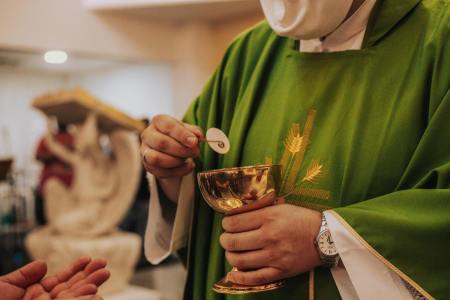Colorado bishops say Catholic politicians who advocate for abortion shouldn’t receive communion

Roman Catholic bishops in Colorado have urged state lawmakers who claim to be Catholic but voted for a newly enacted abortion law to refrain from receiving communion.
In an open letter posted Monday by the Colorado Catholic Conference, the bishops representing the Roman Catholic Dioceses of Colorado Springs and Pueblo and the Archbishop of Denver denounced the recent passage of the state’s Reproductive Health Equity Act. Signed into law by Democratic Gov. Jared Polis in April, the law classifies abortion as a “fundamental right.”
“We have a strong desire to discuss the spiritual and cultural impact of laws like RHEA with politicians of both parties who say they are Catholic and who represent people in our state,” noted the bishops.
“As their shepherds, we want to ensure that they understand the [Catholic] Church’s teaching on receiving Holy Communion and the proper spiritual disposition for doing so.”
The bishops noted that “several Catholic lawmakers support ending the lives of unborn children and declaring that a ‘fertilized egg, embryo or fetus’ has no ‘independent or derivative rights’ in Colorado.” The church leaders labeled this line of thinking “morally bankrupt logic.”
“Until public repentance takes place and sacramental absolution is received in Confession, we ask that those Catholic legislators who live or worship in Colorado and who have voted for RHEA, to voluntarily refrain from receiving Holy Communion,” they stated. “The burden from their decision does not rest upon the shoulders of priests, deacons or lay Extraordinary Ministers of the Eucharist. It rests upon the consciences and souls of those politicians who have chosen to support this evil and unjust law.”
Also known as HB22-1279, the RHEA codified the right to an abortion in Colorado, in response to the possibility that the United States Supreme Court could overturn the 1973 Roe v. Wade decision that legalized abortion nationwide. Democratic state Sen. Julie Gonzales, one of the sponsors of the legislation, released a statement following its approval that elaborated on its purpose.
“With reproductive freedom under attack at the federal level, we’re taking historic action today to ensure Colorado remains a safe haven for folks in need of reproductive health care,” she said back in April. “Until today, Colorado law didn’t expressly protect the right to abortion care. We’re changing that because all Coloradans should have the freedom to make decisions about their lives and their futures.”
The Colorado bishops pointed to The Mystery of the Eucharist in the Life of the Church, a document approved by the U.S. Conference of Catholic Bishops last year, when justifying their call for pro-abortion Catholic lawmakers to refrain from communion. “To receive the Body and Blood of Christ while in a state of mortal sin represents a contradiction,” the document explains.
“The person who, by his or her own action, has broken communion with Christ and His Church but receives the Blessed Sacrament, acts incoherently, both claiming and rejecting communion at the same time. It is thus a counter sign, a lie — it expresses a communion that in fact has been broken,” it added.
The Catechism of the Catholic Church defines abortion as “gravely contrary to the moral law.” The Church’s Code of Canon Law proclaims that those “obstinately persevering in manifest grave sin are not to be admitted to holy communion.” In a 2004 letter to U.S. Catholic Church leadership, then-Cardinal Joseph Ratzinger, who would later become Pope Benedict XVI, advised church officials to withhold communion from pro-choice politicians.
“When a person’s formal cooperation becomes manifest (understood, in the case of a Catholic politician, as his consistently campaigning and voting for permissive abortion and euthanasia laws), his Pastor should meet with him, instructing him about the Church’s teaching, informing him that he is not to present himself for Holy Communion until he brings to an end the objective situation of sin, and warning him that he will otherwise be denied the Eucharist,” Ratzinger wrote.
Ratzinger instructed ministers of communion to “refuse to distribute it” if such “precautionary measures have not had their effect” and the pro-abortion politician continues to present themselves for communion while advocating for permissive abortion and euthanasia laws.
In recent years, there has been great debate among Catholic Church leaders over whether Catholic politicians who advocate for abortion should be denied communion.
Some bishops have argued that doing so holds Catholic politicians who refuse to follow Church teaching to account, while others have claimed that it is counterproductive and wrongfully politicizes a sacrament.
Bishop Robert McElroy of the Diocese of San Diego, who will soon be elevated to the title of Cardinal, wrote in America Magazine last year that “… the proposal to exclude pro-choice Catholic political leaders from the Eucharist is the wrong step. It will bring tremendously destructive consequences — not because of what it says about abortion, but because of what it says about the Eucharist.”
“Fully half the Catholics in the United States will see [excluding pro-abortion political leaders from the Eucharist] as partisan in nature, and it will bring the terrible partisan divisions that have plagued our nation into the very act of worship that is intended by God to cause and signify our oneness.”
Last month, San Francisco Archbishop Salvatore Cordileone garnered national headlines when he told House Speaker Nancy Pelosi, a Catholic who advocates for abortion and who lives in the Archdiocese of San Francisco, that she could not receive communion unless she repented of her support for abortion.
“I am hereby notifying you that you are not to present yourself for Holy Communion and, should you do so, you are not to be admitted to Holy Communion, until such time as you publicly repudiate your advocacy for the legitimacy of abortion and confess and receive absolution of this grave sin in the sacrament of Penance,” Cordileone wrote.





















